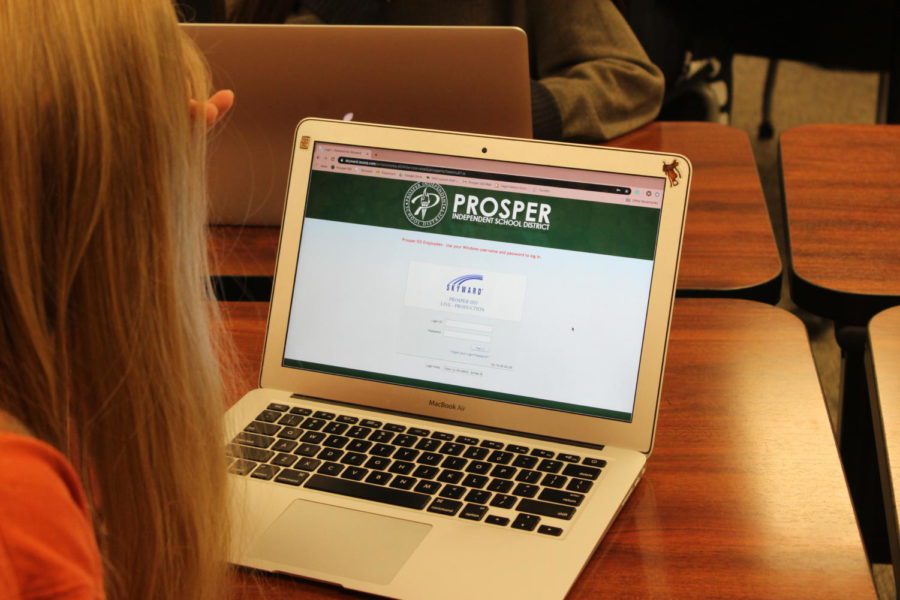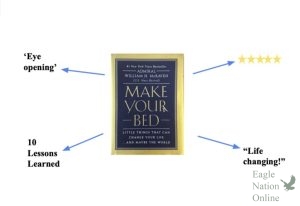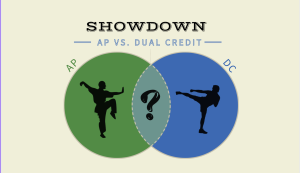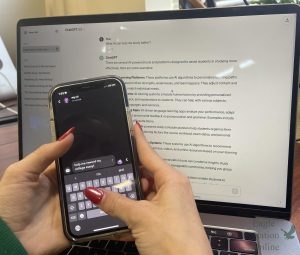Writer calls for students to step away from Skyward grade labels, step into self-worth
Columnist Maddie Moats stares at the skyward login page. Skyward and other grade programs, the website and the mobile app, are a big part of education today. In this article, Moats explains her reasoning for students to obsess less over their scores. “I’m not saying that we should never check our grades,” Moats said. “But having the app on our phone makes it too easy to abuse the convenience and let it become an obsession.”
October 18, 2019
Complete test, quiz, homework assignment, project. Turn in. Check grade in Skyward. Rinse and repeat.
With all of the emphasis on grades today, it can be easy for students to lose themselves in the familiar pattern of constantly checking their scores. Caring about your academic success by striving for good grades is important, but there becomes a point for many when the threshold is crossed between caring and obsessing — obsessing over numbers so much that they become a measure of your worth instead of appreciating yourself as a living and breathing human being.
This ‘many students’ that I have referred to may or may not include me.
No, it absolutely includes me — at least up until my junior year of high school, when I realized a thing or two about grades and education, and what it all means to me.
The first thing I realized is that obsessing over grades doesn’t make them better, it only adds to our anxiety. The relationship between stress over grades and academic performance follows a bell-shape curve. Having no stress about grades, obviously, will cause one to lack the motivation to put forth effort into school, causing their performance to fall. Conversely, having too much stress over grades also lowers performance. Excessive worry takes away from mental health and well-being, which will cause one to burnout. Working yourself under so much pressure isn’t sustainable for long. Academic success is greatest when you feel the healthy, moderate stress levels that motivate you to achieve, but not at the expense of your mental health. Too much stress is not effective in learning because much of learning comes from making mistakes. Too often, the threat of a falling grade holds us back from incorporating creativity into our academic work. But that creativity we sacrifice in order to ‘get the grade’ is vital to our education. Grades shouldn’t scare us into holding back our creative potential in school, especially when taking our education out of the box and into our own imagination is the most fulfilling way to learn. We need to let go of the feeling of ‘right’ and ‘wrong’ that grades so often encourage, and be willing to take a risk, make a ‘mistake,’ learn from it, and know that life goes on as we grow with it. When we find ourselves in the middle of the stress-to-academic-success bell curve, we are motivated enough to care about our work, but not too anxious about our grades to make mistakes in our work.
I also realized that we are the only generation that has had this magnitude of attachment to our grades, and older generations never had access to their grade reports year round like we do. Before apps like Skyward existed, students were presented with their grades at the end of the grading period, and it wasn’t until that point when they could see how the work they produced came together to formulate their grade. It is only now in the digital age that we become so fixated on the minutiae of grades. If we see one bad grade in Skyward, we panic, overreacting, and not rationalizing the minimal effect it will have on our grade at the end of the year. It feels like some of us should pursue accounting with the way we calculate all the possible changes of, say, our math class grade depending on what grade we made on that last test. Don’t act like you don’t do it. Previous generations didn’t have that option of constant grade updates, and they ended up just fine. They were actually able to focus on their education holistically, not taking it grade-by-grade, as many of us do today.
For the sake of our well-being, we all need to take a big step back from our grades and detach the self-worth that we associate with them, detach the stress we receive from them, and judge ourselves holistically, not just by the numbers.
— Maddie Moats
Most importantly, I think we need to let go of our grade obsession because there is much more to us that any number can tell. It’s easy to look at the numbers and associate our quality as a student, or even so much as our quality as a person, with the grade. What those grades don’t show, however, is all of the effort that goes into our education. They don’t show our character as a person, either. And what I have seen is that someone will look at their grades and think that it is a predictor of their success in life. The truth is, our grades in high school pertain to such a short period in our life, and we have so much time to do more and achieve more. We shouldn’t let our grades have such a hold over the way that we view ourselves. Instead, we need to value ourselves for the who we are what we do.
With that being said, one of the best things we can do for ourselves is to delete the Skyward app from our phones. Having such quick and immediate access to our grades can become unhealthy very easily. Some students, myself once included, check their grades over ten times a day, which doesn’t do anything to improve them, and only attaches them more to those numbers. I’m not saying that we should never check our grades, but having the app on our phone makes it too easy to abuse the convenience and let it become an obsession.

























